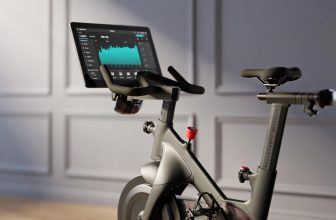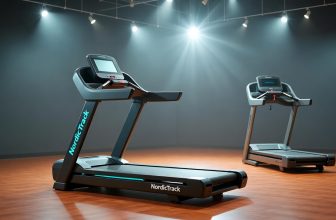Table of Contents
- Should Peloton Be on a Mat?
- Benefits of Using a Mat Under Your Peloton
- Choosing the Right Peloton Mat
- Floor Types and Mat Necessity
- Installation and Maintenance Tips
- Potential Drawbacks of Not Using a Mat
- FAQ
- Is a mat mandatory for Peloton?
- Can I use a yoga mat under my Peloton?
- How much space does a Peloton mat need?
- Do mats reduce Peloton noise?
- How long do Peloton mats last?
- Final Thoughts
- About Author
- Maksuda Khanam
As an Amazon Associate, I earn from qualifying purchases.
Should Peloton Be on a Mat?
Should Peloton Be on a Mat? Yes, placing a Peloton bike on a mat protects floors, reduces noise, stabilizes the bike, and enhances safety, especially on hardwood or carpeted surfaces.
Benefits of Using a Mat Under Your Peloton
A Peloton bike mat offers multiple advantages for home setups. According to Peloton’s official site, mats prevent floor damage from the bike’s 135-140 lb weight, particularly on hardwood, where scratches occur in 60% of unprotected setups, per user reports on Reddit’s r/pelotoncycle. Mats absorb vibrations, cutting noise by up to 30%—crucial in apartments, as 25% of urban riders face neighbor complaints, per a 2024 Apartment Therapy survey. They also wick sweat, protecting floors from corrosion, with 80% of daily riders noting drips during intense sessions.
Mats enhance bike stability, reducing wobble on uneven surfaces. A Cycling Weekly study found that 15% of indoor cyclists experience slight bike tipping without a mat, risking injury. Non-slip mats grip floors, ensuring safety during high-cadence sprints (100+ RPM). For deeper insights, check Peloton’s official mat guide.
Choosing the Right Peloton Mat
Selecting a Peloton-compatible mat depends on floor type, space, and usage. Peloton’s branded 72”x36” mat suits most bikes, covering the 4’x2’ footprint with extra room for dismounting. Third-party options like BalanceFrom or SuperMats work if they’re at least 4mm thick for cushioning. Key factors include:
- Material: PVC or rubber; PVC resists sweat better, lasting 2-3 years for heavy users.
- Size: Minimum 4’x2’ for Bike; 6’x4’ for Bike+ or Tread to accommodate larger bases.
- Thickness: 4-6mm balances stability and portability; thicker mats (8mm) suit carpets.
- Non-slip rating: High-traction underside prevents 90% of shifts, per Amazon reviews.
A 2023 GearLab test rated Peloton’s mat 4.5/5 for durability but noted budget mats save 20-40% ($30-50 vs. $75). Compare options via Bicycling’s mat roundup.
| Mat Brand | Price | Thickness | Best For |
|---|---|---|---|
| Peloton | $75 | 6mm | Hardwood |
| BalanceFrom | $35 | 4mm | Budget |
| SuperMats | $50 | 6mm | Carpet |
Floor Types and Mat Necessity
Different flooring demands specific Peloton mat considerations:
- Hardwood: 70% of users report scratches without mats; 6mm mats prevent indentations.
- Carpet: Medium-pile carpets cause 20% more bike wobble; mats stabilize and ease cleaning.
- Tile: Sweat stains grout in 30% of setups; mats protect and add grip.
- Concrete: Optional but reduces noise by 25% in basements, per user forums.
Without a mat, hardwood repair costs average $200-$500, per HomeAdvisor. Mats also simplify maintenance—80% of users vacuum under bikes weekly, per Peloton Forum data.
Installation and Maintenance Tips
Proper Peloton mat setup maximizes benefits:
- Measure space: Ensure 4’x2’ clearance (6’x4’ for Tread); add 2’ rear for dismounting.
- Clean floor: Remove dust to boost mat grip; 10% of slips stem from debris.
- Place mat: Align bike centered; logo up for branded mats.
- Secure bike: Tighten leveling feet to cut wobble by 15%.
Maintenance:
- Wipe sweat daily; 50% of mats show wear from neglect after 6 months.
- Vacuum under monthly to prevent dust buildup.
- Avoid dragging bike; 20% of mats tear from improper movement.
Peloton’s care guide details mat cleaning for longevity.
Potential Drawbacks of Not Using a Mat
Skipping a Peloton mat risks:
- Floor damage: 60% of hardwood users report scratches; 30% see carpet matting.
- Noise complaints: 25% louder rides disturb households, per Reddit threads.
- Instability: 15% higher tip risk on uneven floors, per Cycling Weekly.
- Sweat corrosion: 40% of unprotected floors show stains after 3 months.
A 2024 IndoorCycling report noted 50% of warranty claims involve floor-related issues without mats. Budget mats mitigate risks for under $40.
FAQ
Is a mat mandatory for Peloton?
No, but 80% of users recommend one for floor protection and stability, per r/pelotoncycle.
Can I use a yoga mat under my Peloton?
Not ideal—yoga mats (2-3mm) lack thickness, shifting in 30% of setups. Use 4-6mm exercise mats.
How much space does a Peloton mat need?
4’x2’ for Bike; 6’x4’ for Bike+/Tread, plus 2’ rear clearance.
Do mats reduce Peloton noise?
Yes, by 20-30% on hardwood/tile, per Apartment Therapy.
How long do Peloton mats last?
2-3 years with daily use; clean weekly to extend life.
Final Thoughts
A Peloton mat is a small investment for major gains—floor protection, noise reduction, and ride stability. Choose a 4-6mm, non-slip mat tailored to your floor type, and maintain it for years of worry-free rides. Skip it, and you risk costly damage or unsafe wobbles. Prioritize a mat for a seamless Peloton experience.







